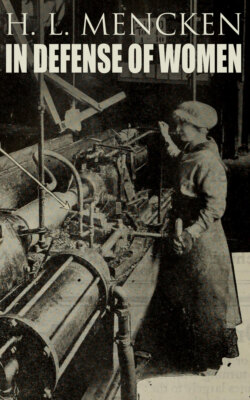Читать книгу In Defense of Women - H. L. Mencken - Страница 7
3. THE MASCULINE BAG OF TRICKS
ОглавлениеWhat men, in their egoism, constantly mistake for a deficiency of intelligence in woman is merely an incapacity for mastering that mass of small intellectual tricks, that complex of petty knowledges, that collection of cerebral rubber stamps, which constitutes the chief mental equipment of the average male. A man thinks that he is more intelligent than his wife because he can add up a column of figures more accurately, and because he understands the imbecile jargon of the stock market, and because he is able to distinguish between the ideas of rival politicians, and because he is privy to the minutiae of some sordid and degrading business or profession, say soap-selling or the law. But these empty talents, of course, are not really signs of a profound intelligence; they are, in fact, merely superficial accomplishments, and their acquirement puts little more strain on the mental powers than a chimpanzee suffers in learning how to catch a penny or scratch a match. The whole bag of tricks of the average business man, or even of the average professional man, is inordinately childish. It takes no more actual sagacity to carry on the everyday hawking and haggling of the world, or to ladle out its normal doses of bad medicine and worse law, than it takes to operate a taxicab or fry a pan of fish. No observant person, indeed, can come into close contact with the general run of business and professional men—I confine myself to those who seem to get on in the world, and exclude the admitted failures—without marvelling at their intellectual lethargy, their incurable ingenuousness, their appalling lack of ordinary sense. The late Charles Francis Adams, a grandson of one American President and a great-grandson of another, after a long lifetime in intimate association with some of the chief business "geniuses" of that paradise of traders and usurers, the United States, reported in his old age that he had never heard a single one of them say anything worth hearing. These were vigorous and masculine men, and in a man's world they were successful men, but intellectually they were all blank cartridges.
There is, indeed, fair ground for arguing that, if men of that kidney were genuinely intelligent, they would never succeed at their gross and driveling concerns—that their very capacity to master and retain such balderdash as constitutes their stock in trade is proof of their inferior mentality. The notion is certainly supported by the familiar incompetency of first rate men for what are called practical concerns. One could not think of Aristotle or Beethoven multiplying 3,472,701 by 99,999 without making a mistake, nor could one think of him remembering the range of this or that railway share for two years, or the number of ten-penny nails in a hundred weight, or the freight on lard from Galveston to Rotterdam. And by the same token one could not imagine him expert at billiards, or at grouse-shooting, or at golf, or at any other of the idiotic games at which what are called successful men commonly divert themselves. In his great study of British genius, Havelock Ellis found that an incapacity for such petty expertness was visible in almost all first rate men. They are bad at tying cravats. They do not understand the fashionable card games. They are puzzled by book-keeping. They know nothing of party politics. In brief, they are inert and impotent in the very fields of endeavour that see the average men's highest performances, and are easily surpassed by men who, in actual intelligence, are about as far below them as the Simidae.
This lack of skill at manual and mental tricks of a trivial character—which must inevitably appear to a barber or a dentist as stupidity, and to a successful haberdasher as downright imbecility—is a character that men of the first class share with women of the first, second and even third classes. There is at the bottom of it, in truth, something unmistakably feminine; its appearance in a man is almost invariably accompanied by the other touch of femaleness that I have described. Nothing, indeed, could be plainer than the fact that women, as a class, are sadly deficient in the small expertness of men as a class. One seldom, if ever, hears of them succeeding in the occupations which bring out such expertness most lavishly—for example, tuning pianos, repairing clocks, practising law, (ie., matching petty tricks with some other lawyer), painting portraits, keeping books, or managing factories—despite the circumstance that the great majority of such occupations are well within their physical powers, and that few of them offer any very formidable social barriers to female entrance. There is no external reason why women shouldn't succeed as operative surgeons; the way is wide open, the rewards are large, and there is a special demand for them on grounds of modesty. Nevertheless, not many women graduates in medicine undertake surgery and it is rare for one of them to make a success of it. There is, again, no external reason why women should not prosper at the bar, or as editors of newspapers, or as managers of the lesser sort of factories, or in the wholesale trade, or as hotel-keepers. The taboos that stand in the way are of very small force; various adventurous women have defied them with impunity; once the door is entered there remains no special handicap within. But, as every one knows, the number of women actually practising these trades and professions is very small, and few of them have attained to any distinction in competition with men.
